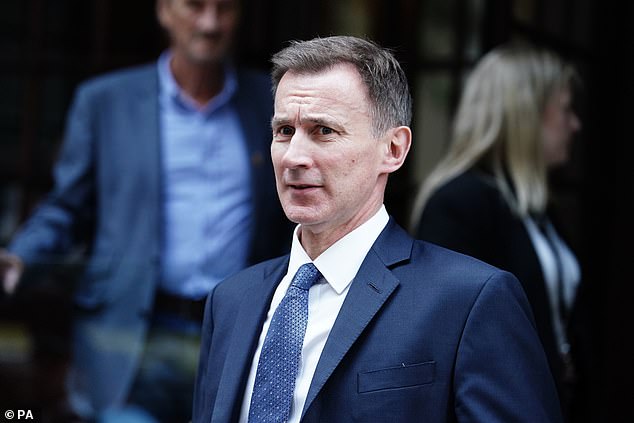Santander has become the first high street bank to shield homeowners from mortgage rate increases while boosting rates for savers.
The Bank of England hiked interest rates on Thursday, adding an average of £612 a year to mortgage payments as lenders increased their standard variable rates (SVRs).
But unlike its competitors, Santander has announced it will hold its SVRs at 7.5 per cent, rather than match the Bank’s 0.25 percentage point uplift.
Skipton Building Society has also made a stand to hold its rates steady, announcing ahead of the base rate decision that it would not hike its SVR but would pass on the increase to savers.
But HSBC and Barclays have already increased their rates in line with inflation, while building societies Suffolk and Newbury pushed rates up by 0.5 percentage points earlier this week.
Santander has announced it will hold its SVRs at 7.5 per cent, rather than match the Bank’s 0.25 percentage point uplift
While Virgin Money increased its rates to a notably high 9.24 per cent.
Dominik Lipnicki, broker at Your Mortgage Decisions, said: ‘For many increases in mortgage rates have been unaffordable so any move to halt increases is a step in the right direction.’
Before the rate decision the average SVR was at 7.85 per cent, meaning some homeowners will now be facing rates of more than 8.1 per cent if their lender does not decide to freeze or reduce deals.
Banks and building societies have scrambled to increase savings rates this week, after facing scrutiny from Jeremy Hunt and City watchdog the Financial Conduct Authority.
Nationwide and HSBC nudged up their rates on Thursday, while Santander announced a 0.25 percentage point increase.
Aldermore, Paragon and Yorkshire Building Society have all improved rates on their deals by up to 0.4 percentage points.
The average one-year fixed savings rate is now 5.23 per cent, or 2.28 per cent for easy-access accounts, Moneyfacts Compare.
Cash Isas pay an average of 5.01 per cent, with easy-access Isas available at a rate of 2.88 per cent.

Banks and building societies have scrambled to increase savings rates this week, after facing scrutiny from Jeremy Hunt and City watchdog the Financial Conduct Authority
Earlier this week Chancellor Jeremy Hunt threatened that failing to pass on rate increases could lead to a regulatory crackdown.
‘It is taking too long for the increases in interest rates to be passed on to savers,’ he said.
But despite these hikes, some banks are still short-changing savers, said Anna Bowes, of rate scrutineer Savings Champion.
‘When the base rate rises, that should spell rate hikes on variable savings rate accounts but some banks are failing to pass on the full 0.25 per cent and not all accounts will see a rise.’
Industry watchdog the Financial Conduct Authority has renewed its call for action and has given banks four weeks to justify offering savers low interest rates or face disciplinary measures.
Economists have warned that the Bank’s sharp series of interest rate hikes has started to hurt businesses, indicating that little more may be needed to rein in inflation.
Kitty Ussher, chief economist at the Institute of Directors, said rates may peak ‘lower than the market is expecting’.
Investors now expect at least two more 0.25 point increases in the base rate, bringing it to a 15-year high of 5.75 by the end of the year.
‘Interest rate rises have had some traction and are affecting confidence,’ she said.
‘Those that are exposed to variable debt or in effected sectors are beginning to say that it’s hurting.’
Inflation has remained stubbornly high at 7.9 per cent. On Wednesday, Rishi Sunak insisted the UK must ‘stick’ to the plan’ to cut inflation even if it means higher mortgage payments for homeowners.
Some links in this article may be affiliate links. If you click on them we may earn a small commission. That helps us fund This Is Money, and keep it free to use. We do not write articles to promote products. We do not allow any commercial relationship to affect our editorial independence.

